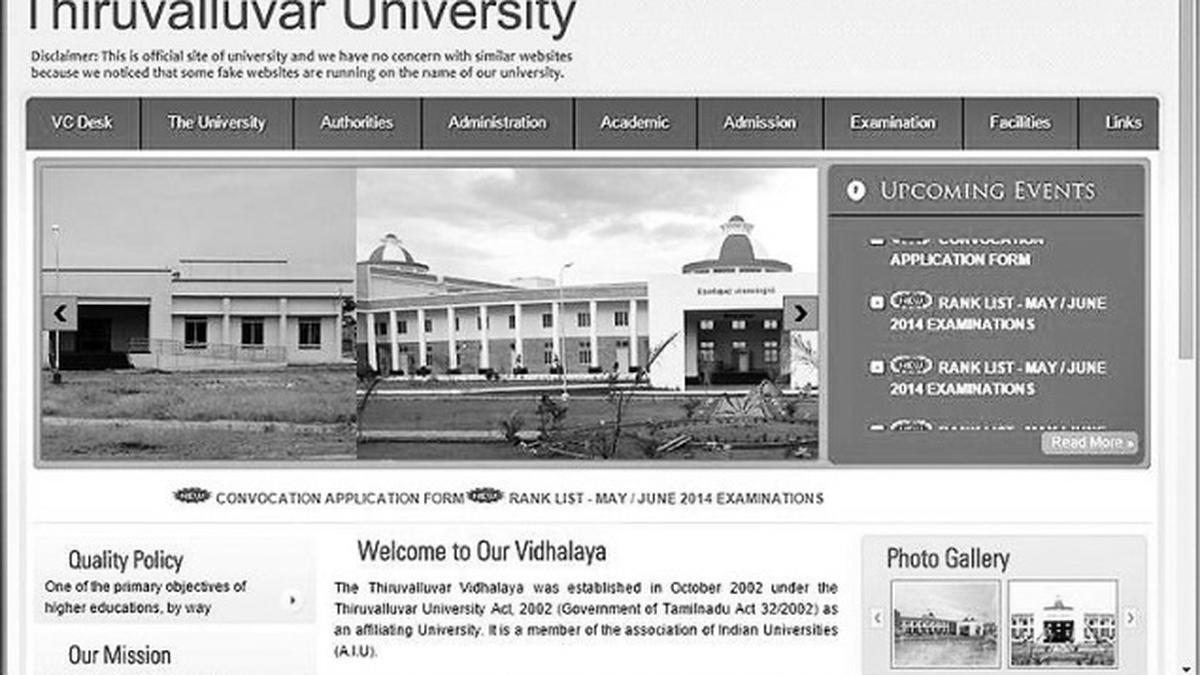In the digital age, where access to information is just a click away, the proliferation of fake websites poses a significant threat to students and educational institutions. Recently, students of Thiruvalluvar University found themselves caught in a web of confusion and anxiety when a fake website, mimicking the official university portal, emerged online. This fraudulent site not only created chaos among the student community but also highlighted the broader issues of cybersecurity and trust in educational platforms.
The Emergence of the Fake Website: A Cause for Concern
Thiruvalluvar University, located in Vellore, Tamil Nadu, is a respected institution known for its commitment to academic excellence. However, the appearance of a fake website bearing the university’s name and logo has thrown students and staff into a state of uncertainty. The counterfeit site, which closely resembled the official university website, misled students into thinking they were accessing legitimate information and services.
For many students, the website was indistinguishable from the real one. It offered similar functionalities, such as access to exam schedules, results, and application forms. However, the content was either outdated, incorrect, or entirely fabricated. The site’s deceptive appearance caused students to unwittingly interact with it, leading to confusion, misinformation, and in some cases, financial loss.
The Impact on Students: Confusion and Anxiety
The fake website’s impact on students cannot be understated. With education increasingly moving online, students rely heavily on official university websites for critical information, such as exam timetables, results, and enrollment procedures. The fake site, by providing inaccurate information, disrupted these processes and created significant stress for students.
Many students reported being unable to access their actual exam results, missing important deadlines, or even paying fees through the fraudulent site. The uncertainty caused by the fake website led to widespread anxiety, as students feared the potential consequences on their academic progress. For those preparing for exams or awaiting results, the confusion added an extra layer of stress to an already challenging period.
Thiruvalluvar University’s Response: Damage Control and Awareness
Upon discovering the fake website, Thiruvalluvar University moved quickly to address the situation. The university issued a public notice warning students about the counterfeit site and provided clear instructions on how to identify the official website. Additionally, the university collaborated with law enforcement and cybersecurity experts to investigate the source of the fake website and to take it down.
The university’s response also included efforts to raise awareness among students about online scams and the importance of verifying website authenticity. Educational institutions across India face similar challenges, and this incident served as a reminder of the need for continuous vigilance in safeguarding digital platforms.
The Broader Issue: Cybersecurity in Education
The incident at Thiruvalluvar University highlights the broader issue of cybersecurity in the education sector. As universities and colleges increasingly adopt digital platforms for communication, administration, and learning, they become prime targets for cybercriminals. Fake websites, phishing attacks, and data breaches are just some of the threats that can disrupt the educational process and compromise sensitive information.
For students, especially those who are not well-versed in digital literacy, distinguishing between a legitimate and a fake website can be difficult. Cybercriminals exploit this vulnerability by creating sites that look and feel authentic, making it easy for unsuspecting users to fall into their traps. The consequences can be severe, ranging from financial loss to identity theft.
Preventive Measures: Protecting Students and Institutions
In the wake of this incident, there are several steps that educational institutions like Thiruvalluvar University can take to protect their students and staff from similar threats in the future:
- Strengthening Cybersecurity Infrastructure: Universities must invest in robust cybersecurity measures to protect their official websites and digital platforms from being duplicated or hacked. This includes regular security audits, encryption, and secure payment gateways.
- Raising Awareness: Educational institutions should regularly educate students and staff about cybersecurity risks and how to identify fake websites and phishing attempts. Workshops, seminars, and digital literacy courses can be effective in this regard.
- Clear Communication Channels: Universities should establish and publicize clear communication channels, such as verified email addresses and official social media accounts, through which students can seek help or verify information.
- Collaboration with Authorities: Institutions should work closely with law enforcement and cybersecurity agencies to swiftly address any incidents of online fraud and to take down fake websites as soon as they are detected.
- Encouraging Student Vigilance: Students should be encouraged to report any suspicious websites or activities to the university authorities immediately. A culture of vigilance can help in early detection and prevention of cybercrimes.
Conclusion: A Wake-Up Call for the Digital Age
The fake website incident at Thiruvalluvar University is a stark reminder of the challenges that come with the increasing digitization of education. While technology has made access to education more convenient, it has also opened the door to new risks. For students and institutions alike, this incident underscores the importance of staying vigilant, informed, and proactive in the face of cybersecurity threats.
As Thiruvalluvar University works to resolve the confusion and prevent future occurrences, it is crucial for the entire education sector to take note. Ensuring the safety and integrity of digital platforms is not just a technical issue—it is a fundamental aspect of providing a secure and reliable educational environment for all students.
Sponsored
FACTS Transcripts
Apply for a University document anywhere
https://www.factstranscript.com
Quick Transcripts for popular Universities, check your University name now and get started. We help you to get your transcript application online which is accepted for use of IRCC.
No DD, NO Paperwork. 100% Authentic, Reliable.
FACTS Transcripts Charges · Reviews · Assam Universities · Home · Know your University










